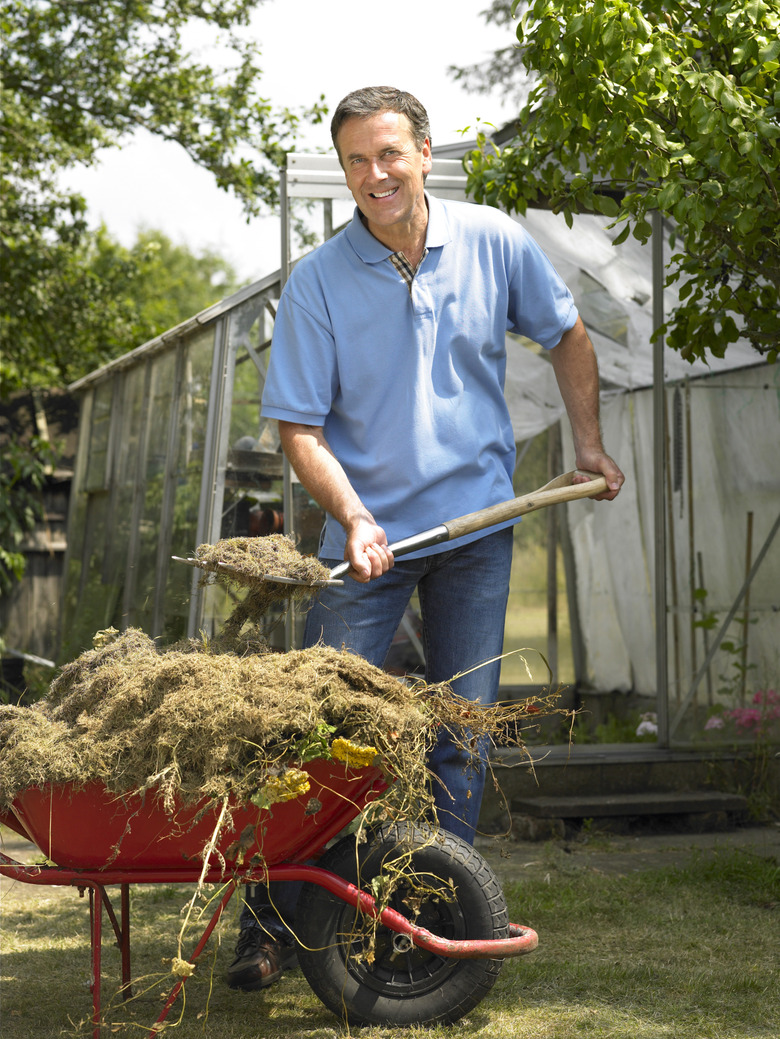The Disadvantages Of Composting
Composting is widely regarded as one of the best methods of maintaining and enhancing the fertility of your garden soil. There is certainly great value in transforming organic waste products into a humus-rich soil amendment teeming with beneficial microbes. Composting does have its disadvantages, and you should be fully informed before you plan your entire garden around the use of large quantities of high-quality compost.
Effort
Step 1
Perhaps the most apparent disadvantage of composting is the amount of effort involved. All the materials must be carried to the compost pile, even weeds and crop residues that come from your garden. Once your pile is large enough to begin heating, you'll need to turn it to make the decomposition faster and more thorough. Turning compost is strenuous work, and you'll need to do it several times to make finished compost within one growing season. When the organic matter is sufficiently decomposed, the compost must be hauled to the garden and spread evenly over the soil surface.
- Composting is widely regarded as one of the best methods of maintaining and enhancing the fertility of your garden soil.
- Composting does have its disadvantages, and you should be fully informed before you plan your entire garden around the use of large quantities of high-quality compost.
Amount Required
Step 1
Composting is especially laborious when you consider the quantity required to fertilize a sizable garden. In his book, "Four-Season Harvest," gardening expert Eliot Coleman recommends an annual 1-inch layer of compost in the early years of building soil fertility and a 1/4- to 1/2-inch layer for established garden soil. One inch of compost on a 30- by 30-foot garden corresponds to approximately 2.8 cubic yards, or almost two full truck loads with a standard short-bed pickup. The volume of fresh organic matter required to make this compost would be two to three times higher. You might have a difficult time collecting, turning and hauling this much composting material.
Lost Nutrients
Step 1
Composting makes nutrients more available to plants and transforms raw organic matter into stable humus, which is critical for long-term soil fertility. But finished compost does not contain all the nutrients that went into the pile as raw materials. If you do not carefully manage and protect your compost pile, nutrient losses can be significant. Nitrogen is most readily reduced during composting because it dissipates into the atmosphere as ammonia, and many other nutrients are leached out of the pile by rainfall. Nutrient losses may be as high as 42 percent for nitrogen, 62 percent for carbon and 6.5 percent for potassium, according to a study published in 1997 in "Journal of Environmental Quality.
- Composting is especially laborious when you consider the quantity required to fertilize a sizable garden.
- In his book, "Four-Season Harvest," gardening expert Eliot Coleman recommends an annual 1-inch layer of compost in the early years of building soil fertility and a 1/4- to 1/2-inch layer for established garden soil.
Cover Crops
Step 1
Composting may distract you from another method of improving the fertility and tilth of garden soil: cover crops. In some ways, cover crops are superior to composting. When a properly mature cover crop is worked into the soil, there is little opportunity for nutrients to leach away or dissipate into the atmosphere. The labor of hauling and turning the compost is replaced by simply digging or tilling in the biomass from the cover crop. Also, cover crops alter the soil in ways that compost cannot — they attract beneficial insects, suppress weeds and improve soil structure with their extensive root systems.
References
- University of Illinois Extension: The Composting Process
- Four-Season Harvest: Organic Vegetables From Your Home Garden All Year Long; Eliot Coleman
- University of Illinois Extension: Composting for the Homeowner
- University of Nebraska-Lincoln: Nutrient, Carbon, and Mass Loss During Composting of Beef Cattle Feedlot Manure
